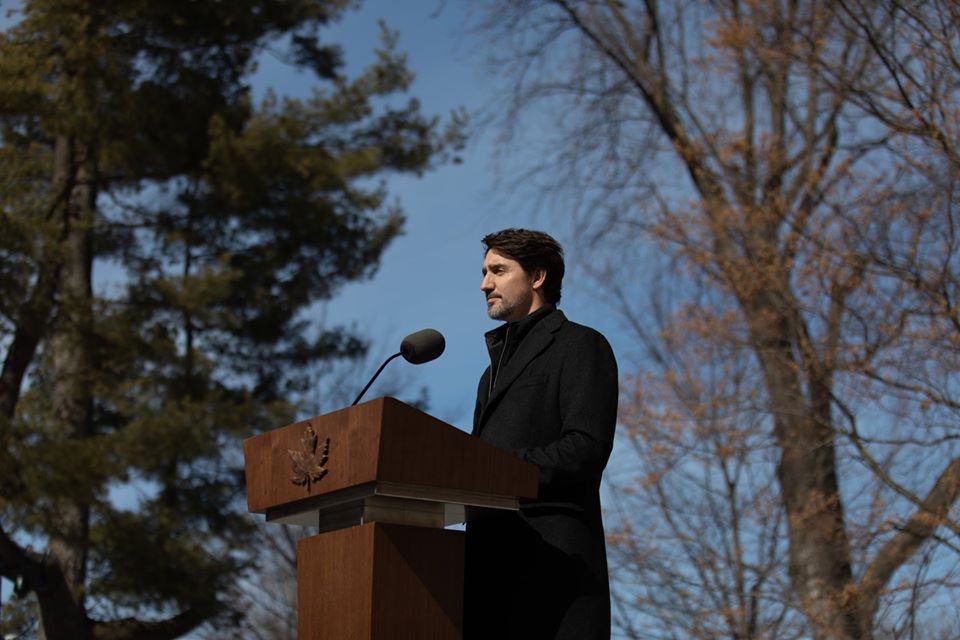Canada News
Ottawa’s pandemic plan lands as provinces ramp up responses to COVID-19

Trudeau said the package is aimed at ensuring people can do what they need to do to protect their health and that of others without fear of not being able to feed their families or pay their rent or mortgages. (File Photo: Justin Trudeau/Facebook)
Prime Minister Justin Trudeau launched an $82 billion pandemic battle plan Wednesday to help Canadians ride out the economic consequences of COVID-19 as the country’s top public health official warned the virus will be here for a while and could come in waves.
Trudeau said the package is aimed at ensuring people can do what they need to do to protect their health and that of others without fear of not being able to feed their families or pay their rent or mortgages.
Provincial governments also took steps to combat the virus, with British Columbia declaring a state of emergency a day after the declaration of a public health emergency.
Saskatchewan declared a provincial state of emergency on Wednesday to give it broader powers as it prohibited public gatherings of more than 50 people and advised against non-essential travel outside the province.
B.C. Solicitor General Mike Farnworth said the declaration will allow for the preservation of supply chains delivering groceries and other essential items in the province.
Quebec reported its first death from COVID-19, an elderly person from the Lanaudiere region, northeast of Montreal.
Nine people have died in Canada from the novel coronavirus, with seven deaths in B.C. and one in Ontario.
Yukon, the Northwest Territories, and Newfoundland and Labrador declared public health emergencies. The declaration in Newfoundland and Labrador ordered businesses including bars, cinemas, theatres, gyms and arenas to close immediately.
In Ottawa, Trudeau announced Canada and the United States agreed Wednesday to close their shared border while allowing trade to continue.
“In these extraordinary times our government is taking extraordinary measures,” Trudeau said in a news conference outside his Ottawa residence.
But as Trudeau focused on the economic fight against novel coronavirus, Dr. Theresa Tam, Canada’s top public health officer, said people should expect the virus that causes COVID-19 to stick around for a long time.
Tam said we need to be prepared for more than one wave of the novel coronavirus. She said it is not known whether COVID-19 will fade and surge again as seasons pass.
Trudeau said the federal government will deploy up to $82 billion in direct spending and deferred taxes to help Canadians get through the pandemic.
He said the financial-aid package will beef up Canada Child Benefit payments for families and GST tax credits for low- and middle-income earners, provide a wage subsidy for small businesses to help them keep staff on the payroll during the slowdown, pause Canada Student Loan payments for six months and establish emergency benefits for people who don’t qualify for employment insurance.
There will be support for shelters that house the homeless or women fleeing domestic violence, to ensure they can help people and manage the need for some to self-isolate.
The biggest single item is deferring tax payments until August, accounting for an estimated $55 billion. The government is also moving the deadline for filing taxes to June 1 but encourage those who receive benefits from the GST credit or the child benefit to file as soon as possible to get access the additional funds available under those programs.
Trudeau said the Canada-U.S. border agreement followed several days of talks between Washington and Ottawa to find a mutually agreeable way to limit the spread of the virus without shutting down vital trade and commerce corridors, which in some cases are lifelines on both sides of the border.
“Travellers will no longer be permitted to cross the border for recreation and tourism,” said Trudeau, who finalized the agreement in a phone call earlier in the day with President Donald Trump. Trudeau likened the measure to a geopolitical version of following sound public-health advice.
Meanwhile, health authorities say the novel coronavirus could overwhelm Canada’s hospitals if it spreads freely. Most people suffer relatively manageable symptoms, such as fevers and coughs, but a small percentage of people who get COVID-19 need intensive care, sometimes for weeks. More than 200,000 people around the world have tested positive for the virus and 8,300 are known to have died from it.





















